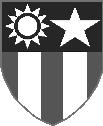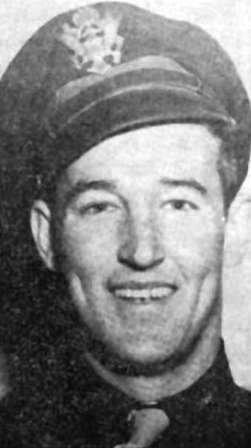|
THE NASHVILLE TENNESSEAN, Monday Morning, Jan. 14, 1946
Tennessean 'Prayed, Sang,
Cussed' as Japs Dug Grave
By LOIS LAYCOOK
What would you do if you were tied to a tree watching Japanese soldiers dig a grave intended for you - expecting the next minute to be your last?
Lt. James M. Taylor, Jr., 23, son of Mr. and Mrs. J. M. Taylor, Sr., of Grand Junction, has the answer - "Cuss, pray and sing."
The Tennessee lad, who spent 10 months as a prisoner of the Japanese, has just returned home after one of the most unusual experiences of the war - that of a man who witnessed the digging of his own grave.
Piloted Fighter Plane
Taylor, a member of the 75th Fighter Squadron, based in China, took off in his P-51 along with 15 other fighters on the morning of November 11, 1944, with Hengyang, China, as their target for a strafing attack.
Arriving over their objective, the squadron spotted several Jap planes over the city, and four Mustangs went down for the kill. Taylor was piloting one of them.
Swooping down in a strafing pass at 400 miles an hour, Taylor was "right on the deck" when his engine failed. Seconds later, the Nips opened fire on his crippled ship and it looked like "curtains." But the officer bailed out at a hazardous 400 feet.
Captured by Japs
After hitting the dirt, Taylor burned his 'chute, maps and papers. He tried to hide from the enemy troops but was soon found by Japs. It was then the grave-digging began.
Tying him to a tree, the soldiers sized the lieutenant's height, picked up shovels and began to dig. Taylor was sure the "jig was up."
He recalled the stories of how other American flyers before him had been executed, and how officers back at headquarters had warned that capture meant almost certain death.
"They'd dig awhile, then they'd stop and rest awhile. Every few minutes they would look over at me and give out with a hysterical laugh. There was almost constant chatter between them, and I could not understand their gibberish."
Went On For Hours
The process went on for hours, and Taylor said he was positive the end was in sight.
"I cussed awhile, prayed awhile, then sang awhile," he recalled "They finished the grave a nice, deep one about 6 o'clock that night. I knew it wouldn't be long."
Then a surprising thing happened. The Japs untied him from the tree and marched him away from the grave. The Grand Junction lad said that he never learned why the execution was called off, but that he "asked no questions."
Taylor was given the usual rough treatment by his captors and was cuffed around quite a bit. One Jap soldier threw a horseshoe at the lieutenant which struck him on the head.
Marched Barefooted
They pulled off his shoes and started him on a march through the city barefooted. Taylor said they met several groups of Jap soldiers during the march. An enemy officer spat in his face Taylor spat back. The startled son of Nippon drew his saber and struck the airman down, and continued beating him with the sword.
After the march through town, Taylor was taken to a prison camp where long hours of questioning began. The Japs learned little of value, however, because the Tennessean said he didn't give them the "straight dope."
After the grilling, he was taken to a guard house where Taylor said he spent three days and nights bound and without food. After 72 hours his hands were untied and he was given a small amount of food.
Solitary Confinement
Two weeks later, Taylor was moved to Hankow where he was placed in solitary confinement for two months and placed on "short rations." During his confinement there, Taylor said he never was permitted to bathe or brush his teeth.
From Hankow, he was shipped to Shanghai where he was confined to a camp with about 1,000 other American prisoners.
Late in May, 1945, Taylor began his last journey as a prisoner of the Japanese a trip to the enemy homeland. It was a long boxcar ride to Peking, through Manchuria and Korea to the Japanese island of Hokkaido. Taylor and 11 other officers were the only prisoners at this camp.
Had Little Food
The Tennessee officer said they were given very little food usually a few cupfuls of rice for the entire group. But on August 15, the food situation improved. Instead of a few handfuls of rice, the Japs began bringing it in by the bucket.
"We knew right then that the war must be over," Taylor declared. "We were sure it was over by the next day when rations improved even more."
Taylor was liberated on September 10, and arrived back in the States on October 16. Born and reared at Grand Junction, Taylor graduated from high school there in 1940. He attended U. T. Junior College at Martin for a year and then went to work for Fisher Aircraft at Memphis before entering the service in September, 1942.
He received his training at the Nashville Classification Center, Maxwell Field, Ala., Cochran Field, Ga., and Spence Field, Ga. He was commissioned in December, 1943, and went overseas in April the following year.
Lieutenant Taylor is at present visiting his uncle, B. Y. Stroupe, Thirty-second Avenue Apartments.

Tennessean 'Prayed, Sang, Cussed' as Japs Dug Grave
Story by Lois Laycook from The Nashville Tennessean, January 14, 1946
Shared by Terry Schwartz
Adapted by Carl. W. Weidenburner.
Read Lt. Taylor's story of the THE DIDDLED DOZEN
More History at THE CBI THEATER
